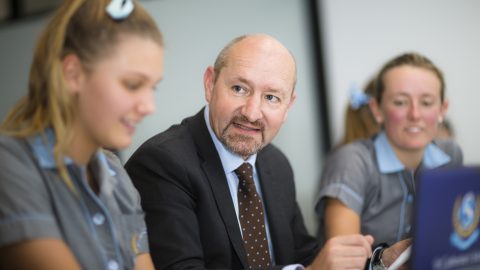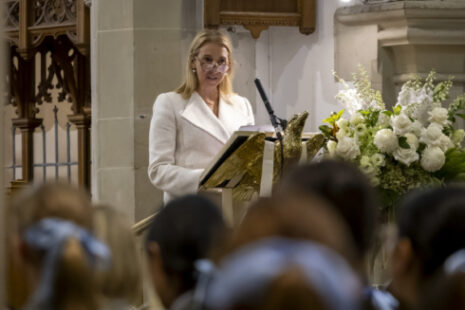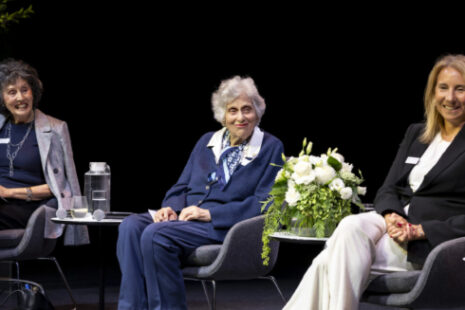The Upside of Teaching is Learning

Teaching facilitates learning, the most challenging, exciting, expansive and complex cognitive activity known to humankind
Perhaps seemingly contradictory, one of the very many upsides of teaching is in fact the opportunity to keep on learning. Once, and clearly for all, the invention of ‘Mr or Ms Google’ has ensured that no matter how much content a teacher may know, a student can access even more with quite literally a flick of the finger. Some doomsday oracles may surmise that such technology has rendered the role of a teacher somewhat redundant but, almost without exception, these so-called futurists have never taught a day in their lives. Teaching, first and foremost, facilitates learning, the most challenging, exciting, expansive and complex cognitive activity known to humankind; facts may be rote learned but depth and theatre can never be replicated by a flick of the finger.
Speaking of expansive and exciting learning, I had the unique and ever so fortunate opportunity this year of attending four European learning and teaching conferences – speaking at two – within the period of a single month; a journey of personal and professional exploration, networking, light-bulb moments, questions, knowing, surprise, confirmation and prompting; perhaps truly, and more certainly, described with one single word…’learning’.
In early June I attended the EDEN Annual Conference which in 2015 was held in Barcelona, and amounted to one of Europe’s premier educational meetings. The theme of the conference was ‘Expanding Learning Scenarios’ and discussion ebbed and flowed from e-competencies and e-skills, through society as a learning environment, to blended learning and beyond open education. I was fortunate to have been invited to address the conference on the theme of learning analytics. The powerful combination of data and learning information, gathered within St Catherine’s home-grown ‘PANDA’ system (Performance and Assessment), is not only innovative but so importantly useful in understanding the value-add of teaching in learning. As a representative of St Catherine’s, I was able to connect with possible global partners including the beginnings of a discussion which may lead to a maker-space pilot program with representatives from the University of Dundee, Scotland.
After the exhilarating learning experience that was Barcelona, I found myself on a journey to Romania. The European Union, who partly fund these ‘mega-education’ conferences, invite speakers to share their presentations across Europe and I was asked to present the story of St Catherine’s and our ‘PANDA’ to a conference in Transylvania! The funny thing was that the conference was actually not primarily focussed upon education but rather on myths and legends (not surprisingly, Dracula was a popular theme) with a couple of high end educationalist presentations thrown in for good measure. Nevertheless, the learning continued unabated – I for one never knew that Dracula in a sense was like McDonald; ‘Mc’ meaning ‘son of’ Donald and ‘ula’ meaning ‘son of’ Drac – with Drac translated as the ‘dragon’, or in our historical bent ‘Vlad’, as in the impaler!
A couple of days later I had one of the finest learning experiences any teacher could wish for – I had lunch with Sir Ken Robinson, the most watched person on the TED talks phenomenon. When I say ‘I had lunch’ I am referring to quite a few people, but yet small enough to have a relatively lengthy and private conversation. That conversation took place in late June as I attended the Digital Education Show at London’s magnificent Olympia Centre, where Sir Ken was a keynote alongside other learning luminaries including Professor Sugata Mitra and Ewan McIntosh. I was like a child in a sweet shop when I had access to world class keynotes and workshops ranging from mobile learning, to 1-2-1 learning, from big data to social media, from cloud based learning to coding, and from gaming to real assessment. The insights, the learning, the pitfalls and the opportunities are now embedded and broadened into the foundation of the work we are beginning to undertake in our very own St Catherine’s learning and teaching framework; never underestimate the power of being able to tap into the very best and the very next-practice. As an aside, any educationalists out there should check out Ross Morrison McGill, the most followed teacher on Twitter in the UK…and now a very good friend of St Catherine’s!
A few days after the Digital Education Show in London, I was back in Barcelona, this time to attend EDULEARN15 – and, wow, what an experience! Professor Donald Clark was the most outstanding keynote on technology and its use in education that I have ever had the good fortune to hear. I am certainly not afraid (rather proud in fact) to share that much of his presentation has been incorporated into St Catherine’s TIDE (Technology, Innovation, Design, Engineering) Program at Years 7 and 8 – we are certainly now on the verge of virtual reality in the classroom as a learning activity. If you are interested in listening to Donald’s amazing speech (be you a teacher or anyone just interested in technology as learning) I could not offer you a more eye-opening, mouth dropping, energy filled experience than this, so please go to this link.
In conclusion, as Director of Curriculum Innovation and Development, the month of June speaking and listening at the four mentioned conferences was a month of unparalleled professional learning. I returned enthused and with a wealth of contacts and experiences which will prove very significant as we venture along the path of St Catherine’s 2020 Vision.
One may conclude that…although perhaps seemingly contradictory, one of the very many upsides of teaching is in fact the opportunity to keep on learning.
Mr Adrian Puckering
Director of Curriculum Innovation and Development





